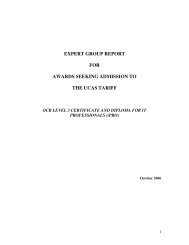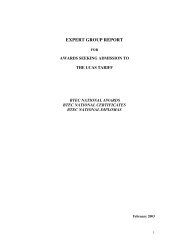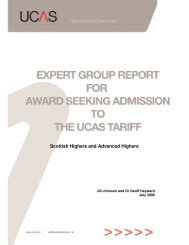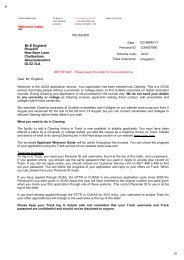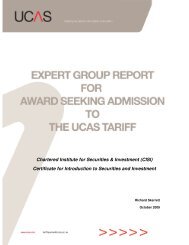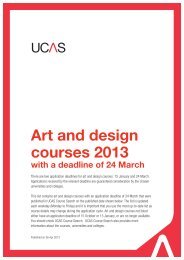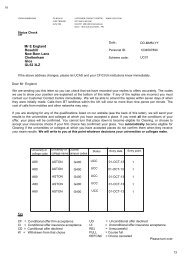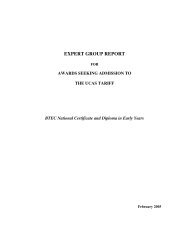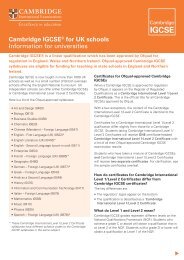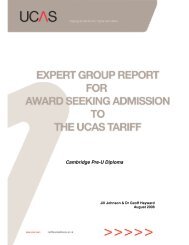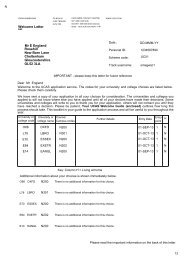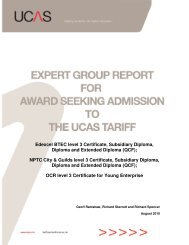International qualifications 2013 (pdf) - CUKAS
International qualifications 2013 (pdf) - CUKAS
International qualifications 2013 (pdf) - CUKAS
You also want an ePaper? Increase the reach of your titles
YUMPU automatically turns print PDFs into web optimized ePapers that Google loves.
Qualifications currently offered<br />
Mycket väl godkänd MVG Pass with special distinction<br />
Väl godkänd VG Pass with distinction<br />
Godkänd G Pass<br />
Icke Godkänd IG Fail<br />
The new system’s grade scale has the classifications A–F,<br />
where A is the highest grade and E is the lowest passing<br />
grade. F means fail.<br />
EDUCATION SYSTEM<br />
After nine years of compulsory education, with English<br />
introduced sometime during the first three years, almost all<br />
pupils proceed to upper secondary school (gymnasieskolan).<br />
Prior to 1 July 2011 they could choose to pursue one of the 16<br />
national programmes or a specially-designed programme. Two<br />
of the national programmes – natural science and social<br />
science – as well as many of the specially-designed<br />
programmes, have an increased focus on university entrance.<br />
There are no formal school leaving examinations. The Slutbetyg<br />
från Gymnasieskolan, usually awarded after three years at an<br />
upper secondary school (gymnasium), gives a grade for each<br />
course, including compulsory and optional courses. Each<br />
subject may include several courses. Grades are based on<br />
continuous internal assessment, with the syllabuses and<br />
criteria for the various grades defined nationally. The certificate<br />
will specify the programme studied: F for complete (2,500<br />
points), U for extended or R for reduced. The Slutbetyg från<br />
Gymnasial Vuxenutbildning requires a minimum of 2,350<br />
points.<br />
In the new system, pupils may choose to pursue one of 18<br />
national programmes; 12 vocational and six that are<br />
preparatory for higher education. Pupils in vocational<br />
programmes may take further courses and thus get basic<br />
eligibility for higher education, which is specified on the<br />
certificate by GB. The six national programmes that are<br />
preparatory for higher education are: Business Management<br />
and Economics (ekonomiprogrammet), Arts (estetiska<br />
programmet), Humanities (humanistiska programmet), Natural<br />
Science (naturvetenskapsprogrammet), Social Science<br />
(samhällsvetenskapsprogrammet) and Technology<br />
(teknikprogrammet). The Examensbevis from Gymnasieskolan,<br />
usually awarded after three years of upper secondary school,<br />
gives a grade for each course, including compulsory and<br />
optional courses. Each subject may include several courses.<br />
Grades are based on continuous internal assessment, with the<br />
syllabuses and criteria for the various grades defined nationally.<br />
The certificate will specify the programme studied: U for<br />
extended. The Examensbevis from Gymnasieskolan requires a<br />
minimum of 2,500 points and will be marked with a U if it has<br />
been extended. The Examensbevis from Gymnasial<br />
Vuxenutbildning requires a minimum of 2,400 points.<br />
ACCESS TO HIGHER EDUCATION<br />
For eligibility for higher education, a certificate must include at<br />
least 2,250 points for courses with a grade of pass or above,<br />
including Swedish, English and mathematics. A complete<br />
programme is required from upper secondary education. In<br />
practice, competition is usually keen for places in higher<br />
education; high grades are needed and specific requirements<br />
must also be satisfied for many university programmes.<br />
All levels of the Swedish education system are currently<br />
undergoing major reforms that will affect all of the above<br />
mentioned regulations. New requirements for eligibility for<br />
higher education will be in place from <strong>2013</strong>.<br />
A bachelor’s degree (Kandidat) is achieved by accumulating at<br />
least 180 credits, with at least 90 in one subject, and takes<br />
three years.<br />
Switzerland<br />
EVALUATION<br />
Schweizerisch anerkanntes kantonales Maturitätszeugnis<br />
Certificat de maturité cantonal reconnu par la Confédération<br />
Attestato di maturità cantonale riconosciuta dalla<br />
Confederazione<br />
Maturitätszeugnis, ausgestellt von der Schweizerischen<br />
Maturitätskommission<br />
Certificat de maturité, délivré par la Commission suisse de<br />
maturité<br />
Attestato di maturità, rilasciato dalla Commissione svizzera<br />
di maturità<br />
Acceptable as group <strong>qualifications</strong> satisfying general entrance<br />
requirements for universities.<br />
GRADING SYSTEM<br />
6 (maximum), 5, 4: satisfactory 3, 2, 1: insufficient<br />
EDUCATION SYSTEM<br />
Considerable educational autonomy rests with the 26 cantons.<br />
Systems thus vary in many quite basic respects, especially<br />
between cantons in different linguistic regions. There is, however,<br />
considerable agreement upon nine years of compulsory education<br />
followed by three or four years of upper-secondary education<br />
leading to the school leaving qualification, a Cantonal Maturity<br />
Certificate or a Federal Maturity Certificate, or a Professional<br />
Maturity Certificate, the name identifying the first language as<br />
German, French or Italian, as noted above. The duration of<br />
schooling up to maturity certificate is 12/13 years.<br />
ACCESS TO HIGHER EDUCATION<br />
The Cantonal Maturity Certificate is the basic qualification for<br />
admission to doctoral/research universities or universities of<br />
teacher education. Most such certificates are specifically<br />
endorsed as ‘federally recognised’; those which are not are<br />
often specialised (eg artistic or pedagogic) and have uncertain<br />
currency, especially outside the specific canton. There is a<br />
numerus clausus for studies in medicine, dentistry and<br />
veterinary medicine. Since the 2001/02 winter semester, Swiss<br />
universities have been busy adjusting their curricula to comply<br />
with the Bologna Declaration. Under this new two-tier system<br />
the first grade awarded is the bachelor’s degree (180 ECTS<br />
credits or three years full-time study) and the second one the<br />
master’s degree (90/120 ECTS credits or one and a half/two<br />
years full-time study). A bachelor’s degree is the prerequisite<br />
for admittance to studies at master’s level. A master’s degree<br />
and good grades are the prerequisite for undertaking a<br />
doctorate.<br />
Furthermore, the universities can confer master’s degrees in<br />
further education, the so-called Master’s of Advanced Studies –<br />
MAS (a minimum of 60 ECTS credits or one year full-time study).<br />
A MAS does not give access to doctoral studies.<br />
Since implementation of the new two-tier study system has not<br />
yet been completed, degrees according to the former system are<br />
still being awarded. The first grade awarded is the<br />
Lizentiat/Licence or Diploma with a total length of full-time study<br />
of four–five years and six years for medical studies (no ECTS<br />
credits). However, experience shows that they usually last one or<br />
58 INTERNATIONAL QUALIFICATIONS



